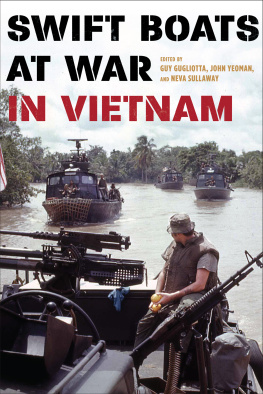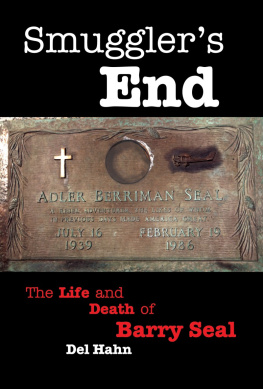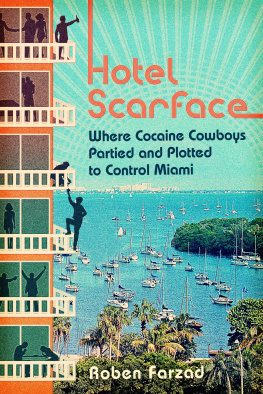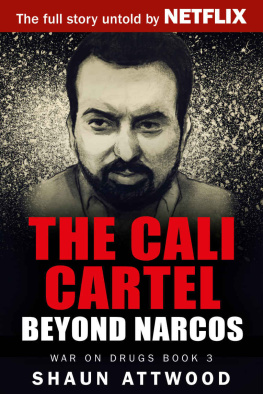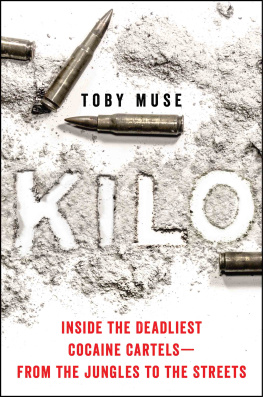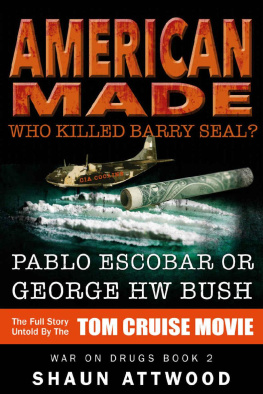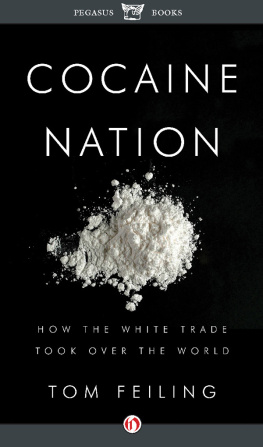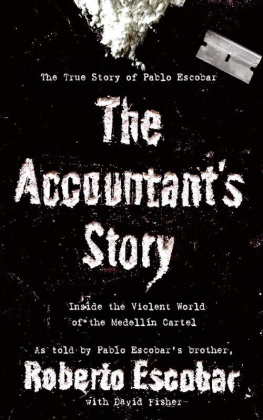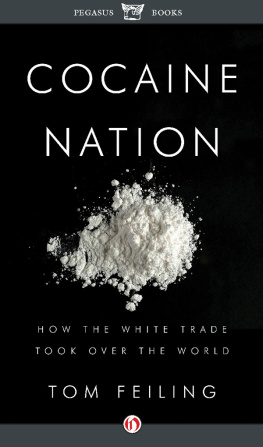ACKNOWLEDGMENTS
The authors conducted more than three hundred interviews during the three and one half years of research that went into this book. Some of those interviewed, like Colonel Jaime Ramirez and Jaime Pardo Leal, have died in the drug wars. Others are in hiding or living in exile, pursued by the traffickers because of what they have written, said, or testified to in court. Many friends in Colombia and the United States at their own request shall not be named here. They know who they are, and they know the debt that is owed them.
Special thanks are due to Colombian news organizations and especially to individual reporters who helped make a difficult and dangerous story comprehensible to outsiders. Their knowledge and assistance were indispensable.
Special thanks are also due to James Savage, the investigations editor of The Miami Herald, who was deeply involved in the conception and execution of a ten-part series that appeared originally in the Herald and later became the basis for this book. The authors would also like to thank Janet Chusmir, executive editor of the Herald, and Pete Weitzel, the paper's managing editor, for granting the authors leaves of absence and the right to use material that had originally appeared in the Herald. City Editor John Brecher and Foreign Editor Mark Seibel were also very gracious in committing their resources to this project. Finally, Rick Ovelmen, the Herald's general counsel, read the manuscript with a keen eye and provided sage advice.
This book could not have been written without substantial cooperation from the people who fight the drug war, particularly those in the U.S. Drug Enforcement Administration, whose diligence and effort at an often thankless task receive too little notice. The authors would like to thank in particular Jack Lawn, the administrator of the DEA, and several of those under his command: William Alden, Charlie Cecil, Errol Chavez, Carol Cooper, Con Daugherty, Robert Feld-kamp, George Frangullie, Larry Galina, Jack Hook, Jake Jacobsen, James Kibble. William Mockler, Johnny Phelps, Mike Vigil, and Billy Yout.
We cannot name everyone who helped us; what follows is only a partial list. We thank Caesar Bernal. John Camp, Fabio Castillo, Can-dace Cunningham, Carlson Daniel, Liz Donovan, Ruthie Golden, Dick Gregorie, Gonzalo Guillen, Carl Hiaasen, Rose Klayman, Bob Levinson, Roberto Martinez, Lynn Medford. Gay Nemeti, Francisco Ramirez Gomez, Carla Anne Robbins. Timothy Ross, Enrique Santos Castillo. Mark Schnapp, Tom Sclafani, AI Singleton. Lewis Tambs, Gray Thomas, Alfonso Torres Robles, and Ron Word.
EPILOGUE
Carlos Lehders sentencing took place on July 20, 1988. Lehder was allowed to speak to U.S. District Judge Howell Melton before the sentence was handed down. But it was a different Carlos Lehder from the one who had sat through the seven-month trial. Gone was the clean-shaven businessman. Now he sported a full beard and mustache. He spoke in English for twenty-eight minutes without notes.
I feel like an Indian in a white mans court, said Lehder. He called himself a political prisoner victimized by an ambitious federal prosecutor. He described his trial as twenty-nine confessed criminals against one Latin.... Witnesses that never had a second underwear claimed they made millions from Lehder.... I was kidnapped from my own country with the complicity of some Colombia police officers.... I was flown against my will to this country. Its a far worse crime than any of these allegations.
I am also against drug abuse. But I am also against kidnapping and extradition. This trial is illegal.
Then Judge Melton spoke.
The truth of the matter is your main goal was to make money, and you did so at the expense of others, Melton said. Your conspiracy burned a path of destruction and despair from the coca fields of South America to the streets and byways of this country. Accordingly, Mr. Lehder, the sentence I impose on you today is meant to be a message for drug smugglers who control large organizations for importers of cocaine and for street pushers.
This sentence is a signal that our country will do everything in its power and within the laws to battle the drug problem that threatens the very fabric of our society.
Then he sentenced Lehder to the maximum, life without parole plus 135 years.
PABLO Escobar also fell on hard times in 1988. A little before dawn January 13, a gigantic car bomb exploded outside the Monaco Building, a fancy eight-story apartment house owned by the Godfather in the upper-crust El Poblado section of Medelln. The bomb killed two night watchmen, dug a thirteen-foot-deep hole in the street, broke windows in dozens of nearby buildings, exploded water mains, and cracked the Monacos concrete facade for its entire length. Escobars wife, Victoria Eugenia, and his twelve-year-old son were sleeping in the Monacos penthouse apartment when the bomb went off. They escaped in a Renault within five minutes of the blast. Escobar was not at home.
The Monaco explosion was the showcase event in the so-called War of the Cartels, a 1988 struggle for cocaine markets, power, and hegemony between Pablo Escobar and the Cali cartel led by Gilberto Rodriguez Orejuela and Jose Santacruz Londoo. Escobar originally blamed the DEA for the Monaco bombing, then decided that the Cali group was trying a power play to eliminate him and take over his networks. Still later he determined that he had a traitor within his own organization and began a ruthless housecleaning.
At the same time, the Colombian army mounted an Antioquia-wide manhunt and twice nearly captured Escobar. When the army failed to pursue the Cali traffickers with the same vigor, Escobar--according to some sources--once again decided that Cali was cooperating with the government in a vendetta against the Medelln cartel. He responded the only way he knew: by September 1988, the army reported eighty people murdered in the War between the Cartels. More than sixty were from Cali.
WHATEVER Escobars problem, it was clear by early 1988 that Jorge Luis Ochoa did not share it. After his holiday departure from La Picota, Ochoa dropped from view. U.S. law enforcement received reports he had stepped back from everyday operations of his vast cocaine empire because his high profile made it almost impossible for him to work effectively in Colombia. Other sources, however, said Ochoa simply reverted to character. When the armys crackdown came, Escobar, as usual, attacked everything that stood in his way. Ochoa, also as usual, hunkered down.
Those who believed in the War of the Cartels blamed the Cali group for fingering Ochoa at the El Cerrito tollbooth in November 1987 and for murdering some higher-ups in his organization. Despite these provocations, however, most sources agreed that neither Ochoa nor his father, Fabio, nor his brothers Juan David and young Fabio were participating in the alleged vendetta.
LIKE Ochoa, Jose Gonzalo Rodriguez Gacha also had no axes to grind with Cali. Both U.S. and Colombian law enforcement agreed that 1988 was the Mexicans1 biggest and most profitable year. With Escobar occupied with gang war and Ochoa out of the picture, Rodriguez Gacha stepped from his colleagues shadow to lead the Medelln cartel in an aggressive expansion into the southwestern United States and Europe.
U.S. lawmen also received reports that in the late spring of 1988 Rodriguez Gacha traveled to New York City in a bid to take over the Cali groups longtime distribution network there. His bigfooting in the New York City borough of Queens, some lawmen said, triggered a summer-long New York version of the War of the Cartels among local cocaine and crack dealers.
Others, however, maintained that Rodriguez Gacha was instrumental in reasonably successful efforts to mend fences between Escobar and Cali. The Queens venture, these sources contended, was simply a business deal--and Rodriguez Gacha, before anything else, was a businessman. In 1988 he joined Escobar and Ochoa for the first time in Forbes magazines list of the worlds billionaires.


